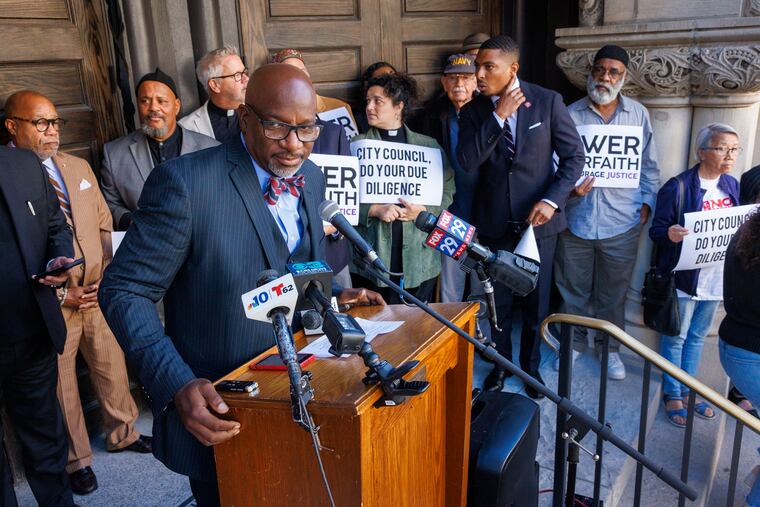POWER clergy call on City Council to consider unanswered questions before approving downtown Sixers’ arena
“Slow your roll!” implored the Rev. Gregory Edwards, interim executive director of POWER Interfaith, a network of about 200 congregations across the state.

A coalition of clergy and faith leaders called on Philadelphia City Council to delve into what they called unanswered and unexplored questions as members prepare to consider approval of the Sixers’ planned downtown arena later this month.
“Slow your roll!” implored the Rev. Gregory Edwards, interim executive director of POWER Interfaith, a network of about 200 congregations across the state. “There is no need to rush the decision. The stakes are too high, and the consequences too great.”
He and two dozen other members and supporters of POWER, which has opposed the $1.55 billion project, gathered on the steps of Mother Bethel African Methodist Episcopal Church in Society Hill on Tuesday to raise questions about what Mayor Cherelle L. Parker has called “a historic agreement” between the city and the team.
“Tenth and Market, 11th and Market, is not the only place the 76ers can play basketball,” said the Rev. Mark Kelly Tyler, pastor of Mother Bethel. “This is not against the basketball team or the franchise, but this is to say that you don’t have to displace anyone to accomplish what you want.”
He pledged, “We’re not going to accept the plan that is before us now. We will fight it.”
Legislation to approve the arena could be introduced in Council on Oct. 24, with a vote possible by the end of the year. Parker formally endorsed the project last month.
The Sixers’ project timeline calls for government approvals by the end of 2024, demolition starting in 2026, and construction beginning in 2028. The arena would open in 2031, when the team’s lease expires at the Wells Fargo Center in South Philadelphia.
A city-sponsored impact study said the arena would not directly displace residents of Chinatown, the neighborhood that would be most impacted by the arena, because no housing would be demolished, but there could be indirect displacement through accelerated gentrification.
“We have full faith in democracy and respect everyone’s right to their opinion,” said Joe Grace, spokesperson for the mayor, who shared information from the administration’s September public presentation that showed the Sixers’ new arena would be a much better financial deal for Philadelphia than previous stadium projects.
Efforts to contact the Sixers for comment were unsuccessful.
On Monday night, speaking to the Mount Airy Business Improvement District, Parker compared Chinatown to the West Oak Lane of her youth, noting that Jewish, Irish, and Italian residents left the neighborhood as Black people began arriving in the late 1980s and early 1990s.
“I’m ultrasensitive about making good on my commitment to preserve [Chinatown] because my lived life experience has unfortunately put me in a position to know,” the mayor said. “I am committed to ensuring the preservation of Chinatown, the cultural authenticity, the cultural value that’s presented there.”
Parker said she saw the arena as a means to revitalize beleaguered Market Street East, once the region’s retail hub. The Sixers’ investment “could be the nucleus for the revival of the Market Street that I knew when I was growing up,” she said.
The Philadelphia Building and Construction Trades Council, a deep-pocketed coalition of more than 30 unions that was key to Parker’s victory in last year’s mayoral election, is strongly in favor of the arena. The project has also been endorsed by Local 32BJ of the Service Employees International Union, the African American Chamber of Commerce of Pennsylvania, New Jersey and Delaware, and the Black Clergy of Philadelphia and Vicinity, all key political actors with influence on Council.
Speakers at the church news conference said big questions remain about traffic, parking and impact on nearby residential areas. They asked why a key part of the enabling arena legislation, a Community Benefits Agreement where the Sixers would provide $50 million worth of amenities and services, was negotiated between the city and the team.
“A Community Benefits Agreement should start with the community,” Tyler said. “There’s no one from Chinatown, from Washington Square West. The two communities have both spoken the loudest about this and have expressed their concerns and their desire to have it somewhere else. … The absence of the community, again, is just not a good starting point.”